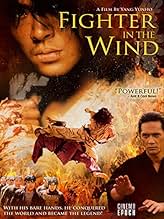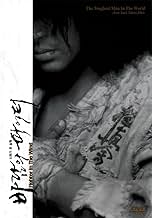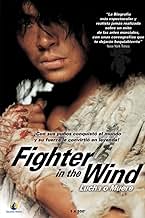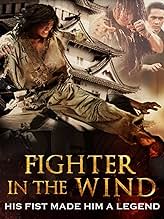IMDb-BEWERTUNG
6,9/10
4309
IHRE BEWERTUNG
Füge eine Handlung in deiner Sprache hinzuIt is a Korean boy who went to Japan and started to learn Karate from his brother.It is a Korean boy who went to Japan and started to learn Karate from his brother.It is a Korean boy who went to Japan and started to learn Karate from his brother.
- Auszeichnungen
- 1 Gewinn & 2 Nominierungen insgesamt
Kim Won-shik
- Boy
- (as Won-sik Kim)
Empfohlene Bewertungen
OK, first things first; this is NOT a martial arts kung-fu beat em up movie (If you want that, go watch Ong-Bak!). Throw those expectations OUT and prepare to enjoy a very gripping action/drama with some of the most beautiful filmwork i've seen in a while. To keep it simple, this movie is very exaggerated biography of Choi Baedal (Later changed his name to Mas Oyama), founder of Kyokushin karate, starting from before WW2. The fight scenes are not like standard kungfu flicks. They don't fight for 5 minutes. It's realistic in this sense. They trade a few blows and one or the other falls down in severe pain. This movie screams of a comic book feel. Fight scenes are stopped in mid-action to emphasize the form and the impact of the blows, the color and framing of each shot is reminiscent of comics as well. It emphasizes Choi Baedal's super-heroish qualities. The storyline is very interesting, although it runs a little long. Overall, its a very beautiful film to watch. Its great to see a movie really focus on the philosophies and ideas of martial arts rather than just the fighting itself. It also deals with the fears mindset of a fighter. Its VERY sad, and can sometimes come off as corny, but the overall emotional impact is there. Watch it, and remember, its NOT a pure kung fu beat em up movie and you will enjoy it.
'Paramui Paito (Fighter in the Wind) is based on the events in the life of legendary Korean martial artist Choi Bae-dal. Or more precisely, the film is based on the comic book based on the martial artist's life _ a difference that can be felt throughout this entertaining but factually suspect movie.
The first of a handful of local films about famous Koreans who lived during the Japanese occupation period, ''Fighter in the Wind tells of the early part of Choi¡¯s life, how he sneaked into Japan in the late 1930s in hopes of becoming a pilot, joined the martial arts community there, and after training by himself in the mountains for 18 months, came down to become the top fighter of that country.
The film offers a seemingly sentimentalized version of the same story, especially playing up the outsider aspect of Choi's experiences, of his being a Korean in Japanese society. Given the story's xenophobic elements, which include evil yakuzas exploiting Koreans, it will be interesting to see how a Japanese audience responds to the film when it gets released there as planned.
''Fighter¡¯s best moments hint at the moral complexity of films like ''Raging Bull,¡¯¡¯ Martin Scorcese¡¯s boxing masterpiece. At first, Choi¡¯s motivation to become Japan¡¯s best seems to be connected to righting injustices felt by Koreans in Japan, but as he travels to martial arts schools enduring punishment after punishment, it becomes less clear as to what he is trying to prove.
But such insights are all too brief in the film, which is so heavy on the melodrama and action that it's difficult to take too seriously. By the end, the story resembles a kung fu film from Hong Kong, complete with a geisha girlfriend (Ara Hirayama), who tries to turn Choi into a lover not a fighter, and elder statesmen of the Japanese martial arts community who will go to any lengths to keep a Korean from becoming Japan's best. It's not the most inventive of plots, but the film keeps it entertaining throughout.
Singer and actor Bi (Rain) was initially cast for the lead role of Choi but had to pull out due to schedule conflicts. It¡¯s a good thing too, for the rail-thin pop singer wouldn¡¯t have been able to take the physical punishment the role required.
Instead, we get Yang Dong-geun, a burly actor who plays the part to near perfection. It¡¯s refreshing to see this young and talented actor take on a substantial role for a change, and he brings to ''Fighter the necessary savagery and physical presence to make it work.
The first of a handful of local films about famous Koreans who lived during the Japanese occupation period, ''Fighter in the Wind tells of the early part of Choi¡¯s life, how he sneaked into Japan in the late 1930s in hopes of becoming a pilot, joined the martial arts community there, and after training by himself in the mountains for 18 months, came down to become the top fighter of that country.
The film offers a seemingly sentimentalized version of the same story, especially playing up the outsider aspect of Choi's experiences, of his being a Korean in Japanese society. Given the story's xenophobic elements, which include evil yakuzas exploiting Koreans, it will be interesting to see how a Japanese audience responds to the film when it gets released there as planned.
''Fighter¡¯s best moments hint at the moral complexity of films like ''Raging Bull,¡¯¡¯ Martin Scorcese¡¯s boxing masterpiece. At first, Choi¡¯s motivation to become Japan¡¯s best seems to be connected to righting injustices felt by Koreans in Japan, but as he travels to martial arts schools enduring punishment after punishment, it becomes less clear as to what he is trying to prove.
But such insights are all too brief in the film, which is so heavy on the melodrama and action that it's difficult to take too seriously. By the end, the story resembles a kung fu film from Hong Kong, complete with a geisha girlfriend (Ara Hirayama), who tries to turn Choi into a lover not a fighter, and elder statesmen of the Japanese martial arts community who will go to any lengths to keep a Korean from becoming Japan's best. It's not the most inventive of plots, but the film keeps it entertaining throughout.
Singer and actor Bi (Rain) was initially cast for the lead role of Choi but had to pull out due to schedule conflicts. It¡¯s a good thing too, for the rail-thin pop singer wouldn¡¯t have been able to take the physical punishment the role required.
Instead, we get Yang Dong-geun, a burly actor who plays the part to near perfection. It¡¯s refreshing to see this young and talented actor take on a substantial role for a change, and he brings to ''Fighter the necessary savagery and physical presence to make it work.
I watched this movie the other night, but i found it quite enjoyable. While I will agree that though there are enough fights, they aren't nearly long enough. But the length of the fight isn't what makes them good, it's how well they're done with the time given. Like if you're going to throw a punch at someone, but stop yourself only centimeters from your target, proving to everyone that you have defeated him and he was powerless to stop you, well that is pure quality right there. I loved the main character. He willingly put himself through hell with his training, and became one of the most focused and determined fighters i've ever seen in a movie The story wasn't the best, but i still found this movie fun
6Ky-D
I was pretty excited when this hit theaters. There was a lot of buzz floating around about it being the next great martial arts film. Unfortunately, for everything it does right, it does equal wrong.
For starters, this is a martial arts film, so you would assume there would be lots of fighting. And there is fighting, just not all that much. Most of the film is littered with lengthy dialogue scenes that are intended to deepen the characters, but this fails as well. Character motivation seems to be limited to "spur of the moment" reasoning and the ultimate plot is nothing more than standard fight-film fare (boy gets beat up a lot, boy trains, boy beats up everybody).
This isn't to say that the film doesn't have some positive aspects. The film is gorgeous; color, cinematography, lighting, all handled with expert flare. As for the fights (when the film gets around to them), they are excellent. Eskewing the modern trend penchant for treating fights like elaborate dance sequences, here instead we get some real hard-hitting brawls that also maintain a look of grace.
If only the filmmakers had put as much effort into the writing as they did into the look of the film, this could easily have been one of the top martial art films, instead of mild entertainment destined to be forgotten.
Score: 6/10
For starters, this is a martial arts film, so you would assume there would be lots of fighting. And there is fighting, just not all that much. Most of the film is littered with lengthy dialogue scenes that are intended to deepen the characters, but this fails as well. Character motivation seems to be limited to "spur of the moment" reasoning and the ultimate plot is nothing more than standard fight-film fare (boy gets beat up a lot, boy trains, boy beats up everybody).
This isn't to say that the film doesn't have some positive aspects. The film is gorgeous; color, cinematography, lighting, all handled with expert flare. As for the fights (when the film gets around to them), they are excellent. Eskewing the modern trend penchant for treating fights like elaborate dance sequences, here instead we get some real hard-hitting brawls that also maintain a look of grace.
If only the filmmakers had put as much effort into the writing as they did into the look of the film, this could easily have been one of the top martial art films, instead of mild entertainment destined to be forgotten.
Score: 6/10
I believe that this is one of the best movies to come out Korea in along time. It has got heart and soul and you can see that the director and the cast really care about bringing to life this story of one of the greatest martial artist in history. However despite how much I enjoyed this film there were a few flaws.
First some emotional parts in the story moves to fast and there are scenes f Korean and Japanese customs (such as shaving his eyebrows) that we don't understand and we are not given an explanation to. Another thing is that some moments of this movie are incredibly exxagerated and some are just made up for the movie. I don't understand why they did this since Oyama Mas had an amazing life without all the made up scenes.
Last is the action, I hear that most people didn't like the action because the fight scenes were short and brutal. However because I do martial arts and know a lot about Oyama Mas I believe that this was the right way for the movie. This is because Oyama never did any soft kungfu which you see in most movies these days, He did hard taekwondo and later created kyokushin karate and he always tried to finch his opponent with one punch. combat is not a dance where you can predict each other movements.
First some emotional parts in the story moves to fast and there are scenes f Korean and Japanese customs (such as shaving his eyebrows) that we don't understand and we are not given an explanation to. Another thing is that some moments of this movie are incredibly exxagerated and some are just made up for the movie. I don't understand why they did this since Oyama Mas had an amazing life without all the made up scenes.
Last is the action, I hear that most people didn't like the action because the fight scenes were short and brutal. However because I do martial arts and know a lot about Oyama Mas I believe that this was the right way for the movie. This is because Oyama never did any soft kungfu which you see in most movies these days, He did hard taekwondo and later created kyokushin karate and he always tried to finch his opponent with one punch. combat is not a dance where you can predict each other movements.
Wusstest du schon
- WissenswertesThis movie is based on the true life story of Choi Yeong-eui (who later changed his name to Masutatsu Oyama), the founder of Kyokushin Karate. Choi was born in South Korea in 1923, immigrated to Japan in 1938, and founded the Kyokushin Karate organization in 1953. Currently, Kyokushin Karate is practiced by more than 12 million practitioners in over 120 countries around the world.
- VerbindungenFeatured in WatchMojo: Top 10 Underrated Martial Arts Movies (2017)
- SoundtracksIllusive Consensus
Lyrics by Simone Simons
Music by Mark Jansen, Ad Sluijter, Coen Janssen Simone Simons
Performed by Epica
Top-Auswahl
Melde dich zum Bewerten an und greife auf die Watchlist für personalisierte Empfehlungen zu.
- How long is Fighter in the Wind?Powered by Alexa
Details
- Erscheinungsdatum
- Herkunftsland
- Offizieller Standort
- Sprachen
- Auch bekannt als
- Fighter in the Wind
- Drehorte
- Produktionsfirmen
- Weitere beteiligte Unternehmen bei IMDbPro anzeigen
Box Office
- Budget
- 6.000.000 $ (geschätzt)
- Weltweiter Bruttoertrag
- 1.518 $
- Laufzeit2 Stunden
- Farbe
- Sound-Mix
- Seitenverhältnis
- 1.85 : 1
Zu dieser Seite beitragen
Bearbeitung vorschlagen oder fehlenden Inhalt hinzufügen

Oberste Lücke
By what name was Baramui paiteo (2004) officially released in Canada in English?
Antwort
























